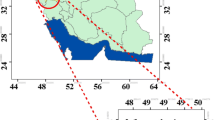Abstract
The mitigation of adverse effects of agriculture on ecosystems, due to the use of agrochemicals and irrigation water, is expected to have implications on farm incomes. This study examines the possibilities of simultaneously achieving environmental goals such as the reduction of agrochemical and irrigation water use as well as acceptable farm incomes. The empirical analysis employs the multi-objective programming method in order to define alternative crop plans for River Strymonas region in Greece. The results reveal considerable possibilities for reducing input use as well as severe impact on incomes in terms of gross margin, which indicate a wide range of policy options. It is argued that the choice of the ideal solution should be based on several criteria including non-market values of environmental benefits, the particular objectives of policy makers and human preferences, especially the acceptance of each crop plan by stakeholders.
Similar content being viewed by others
References
Begum AA, Manos B, Manikas I (2007) Implementation of fertiliser policy in Bangladesh under alternative scenarios: an application of multicriteria modeling. Asian Pac J Oper Res 24(6):1–23
Berbel J, Rodriguez-Ocana A (1998) An MCDM approach to production analysis: an application to irrigated farms in Southern Spain. Eur J Oper Res 107:108–118
Burton RO, Martin MA (1987) Restrictions on herbicide use: an analysis of the economic impacts on US agriculture. North Cent J Agric Econ 9(2):181–194
Cohon JL (1978) Multiobjective programming and planning. Academic Press, New York
Gomez-Limon JA, Arriaza M, Berbel J (2002) Conflicting implementation of agricultural and water policies in irrigated areas in the EU. J Agric Econ 53(2):259–281
Halkidis I, Papadimos D (2007) Technical report of LIFE Environment project: ecosystem based water resources management to minimize environmental impacts from agriculture using State of the Art Modelling Tools in Strymonas Basin. Greek Biotope/Wetland Centre (EKBY)
Hitchens MT, Thampapillai DJ, Sinden JA (1978) The opportunity cost criterion for land allocation. Rev Mark Agric Econ 46:275–293
Manos B (1991) Farm planning with multiple objectives. An application of compromise programming in Greece. Agric Mediterr 121:224–238
Manos B, Gavezos E (1995) A Multiobjective Programming Model for farm regional planning in northern Greece. Q J Inter Agric 34:32–52
Manos B, Bournaris T, Kamruzzaman M, Begum AA, Papathanasiou J (2006) The regional impact of irrigation water pricing in Greece under alternative scenarios of European policy: a multicriteria analysis. Reg Stud 40:1055–1068
Muthmann R (2002) Remarks, Minutes of Ariadne International Conference. Chania, Greece, 13–15 November 2002
OECD (2001) Multifunctionality: towards an analytical framework. OECD, Paris
Piech B, Rehman T (1993) Application of multiple criteria decision making methods to farm planning: a case study. Agric Syst 41:305–319
Pretty JN, Brett C, Gee D et al (2000) An assessment of the total external costs of UK agriculture. Agric Syst 65:113–136
Romero C, Rehman T (1989) Multiple criteria analysis for agricultural decisions. Elsevier, Amsterdam
Romero C, Amador F, Barco A (1987) Multiple objectives in agricultural planning: a compromise programming application. Am J Agric Econ 69:78–86
Thampapillai DJ, Sinden JA (1979) Trade-offs for multiple objective planning through linear programming. Water Resour Res 15:1028–1033
Yu PL (1973) A class of solutions for group decision problems. Manag Sci 19:936–946
Acknowledgments
The authors gratefully acknowledge the financial contribution of the Greek Biotope/Wetland Centre (EKBY) via the project “Ecosystem Based Water Resources Management to Minimize Environmental Impacts from Agriculture Using State of the Art Modelling Tools in Strymonas Basin”.
Author information
Authors and Affiliations
Corresponding author
Rights and permissions
About this article
Cite this article
Ragkos, A., Psychoudakis, A. Minimizing adverse environmental effects of agriculture: a multi-objective programming approach. Oper Res Int J 9, 267–280 (2009). https://doi.org/10.1007/s12351-009-0058-2
Received:
Revised:
Accepted:
Published:
Issue Date:
DOI: https://doi.org/10.1007/s12351-009-0058-2




